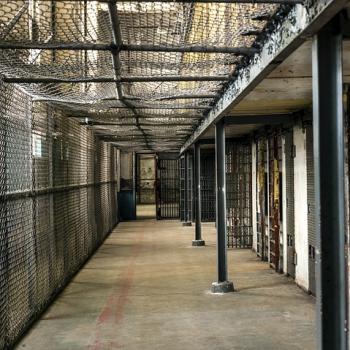At this point my blurry memory snaps sharply into focus. When we came to fornication, I said yes. I was in college, I had a boyfriend, and as a scrupulous little convert, very fuzzy on what exactly constituted fornication. I just wanted to be sure. I just wanted to be clean.
I remember vividly everything about his voice and the way his mouth moved when he began probing the details of my sex life, when he didn’t move on as I assumed he would. How his jaw went soft and slack on the “x” in “anal sex?” and “oral sex?” How his mouth never seemed to quite close. His eyes were bright, and the room was hot, so hot and small, and nothing seemed to exist outside of it. No one I loved knew I was here. There was cold sweat on my temples and his knee almost touched mine. “Did you spit or did you…” he leaned forward and seemed to want me to say “swallow” for him.
When the interview was done, he abruptly told me I was under interdict to avoid Communion for a year. I was to read a chapter of the Gospels every day, and set up another appointment with him very soon, and oh by the way, he was my spiritual father now. He gave me an icon card of Christ with the Jesus Prayer in Greek on the back. I clutched it so tight when I knelt beneath his stole for his blessing I thought my palm would bleed. He gave me his number and urged me to call him soon. I never did.
On the drive home, the gray day turned to rain. I did not realize I was shaking and crying until I was well outside of the monastery gates. I didn’t even quite know why. Never in my time in Orthodoxy had I felt so terrified, alone, and disgusting. I thought of calling my boyfriend, but thought better of it. What would I say? What could he say? And how would I explain to him that I couldn’t join him in the Communion line for a year? I hadn’t even known anyone of any rank in the Church could do that, shut you out from receiving the Lord with a word. I’d come to the monastery looking for an easy yoke and a light burden, and got a millstone instead.
In despair, I called the priest who had chrismated me years prior. I didn’t give him very many details—he was angry enough when I only told him the gist of what had happened. Angry at the monastery, at the monks, at the Ephraimites. H assured me that Elder Ephraim’s brand of monasticism was not the standard and that I didn’t have to do a damn thing that monk said. It was comforting at the time, and made me feel marginally better. But I hadn’t told him the whole truth. I still didn’t feel clean, and wouldn’t for a very long time afterward.
Living with anxiety makes it very easy for my mind to travel back and forth in time, especially to traumatic events. I go back to that afternoon often, as vivid as the day I lived it, and I sit in the passenger seat as my younger self drives home in the rain. I tell her what she didn’t have the vocabulary to articulate then, that her salvation did not and never would hinge upon a strange man in a robe leering at her in a cramped room, asking her if she spit or swallowed. That it was extraordinarily inappropriate behavior, that it doesn’t matter that other people have been abused in much worse ways in the Church—every victim of abuse says that as a way to minimize their experience, from the verbally abused down to the most brutally beaten and violated.
No matter how I go back and alter that memory, no matter what I say to my younger self, it doesn’t change the fact of what happened. I was a young, impressionable, vulnerable girl sitting alone in a tiny room in the middle of nowhere with a man who had blithely assumed total control over my salvation, grilling me in needless detail about my sex life. There was no valid theological reason for it. None at all. My good and honest confession was not predicated on whether or not this oily-bearded man knew the intimate details of what had been where, on or in my body. I know that now. But it’s taken me years to know it.
The veracity of the accounts coming out of Elder Ephraim’s monasteries is hotly contested on the Orthodox internet. But looking back on my experiences that afternoon, I believe them all. The two common threads reportedly running throughout the teachings of the Elder’s disciples are an obsession with sex (especially woman’s “sinful” role in an already inherently “sinful” act) and an insistence on blind obedience that, in many accounts, reaches the level of clear gaslighting and psychological abuse. Both of these without a doubt colored my experience. And it makes me gravely concerned about the accounts we don’t hear, and maybe never will.
My own experience, among other things, ultimately cost me my faith. I do not consider myself Orthodox any longer, and have no ill will towards the Church in general. But I am deeply disappointed and angry that nothing has been done by the hierarchy to curb the twisted, abusive advance of the Ephraimites in the US. I don’t expect anything will be done. Change comes slow within Orthodoxy, when it comes at all. And even now there are men with beards who have read a lot of Patristic books typing furiously in a comment section somewhere about how my confessor that day really did nothing wrong. But change is coming from the outside, whether the Church likes it or not. Victims of abuse within and without the Church have no time left to wait. The Church must be ready to respond with compassion and justice, and hate silence when it is time to speak. In the post-Weinstein world the old order of silence, complicity, and hiding is quickly burning down; that which isn’t flint is tinder.













